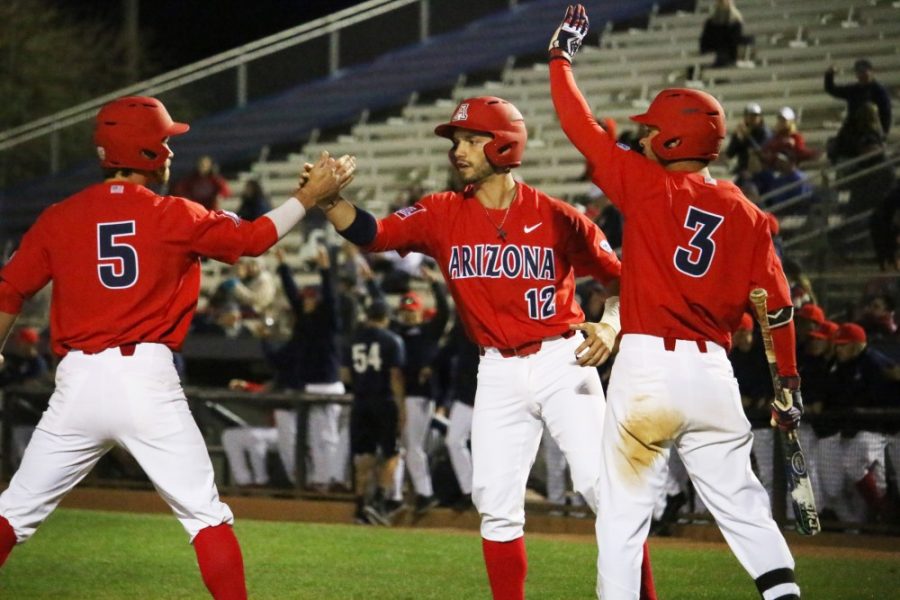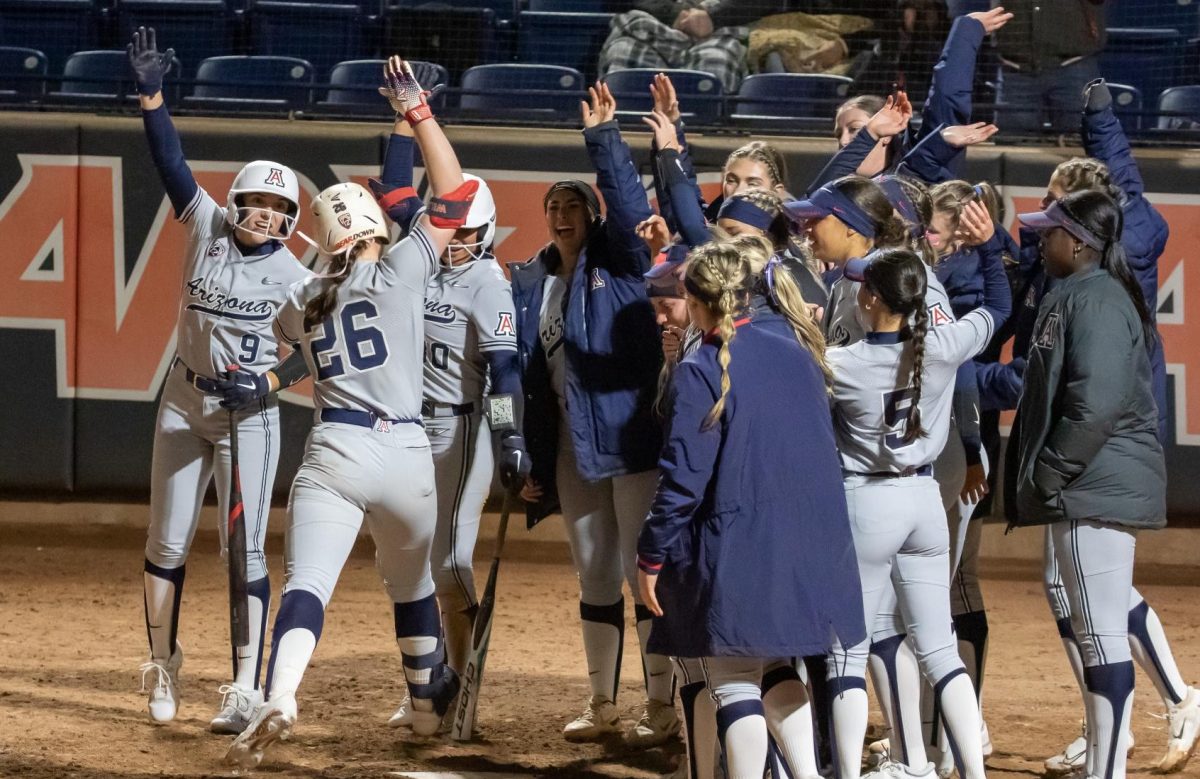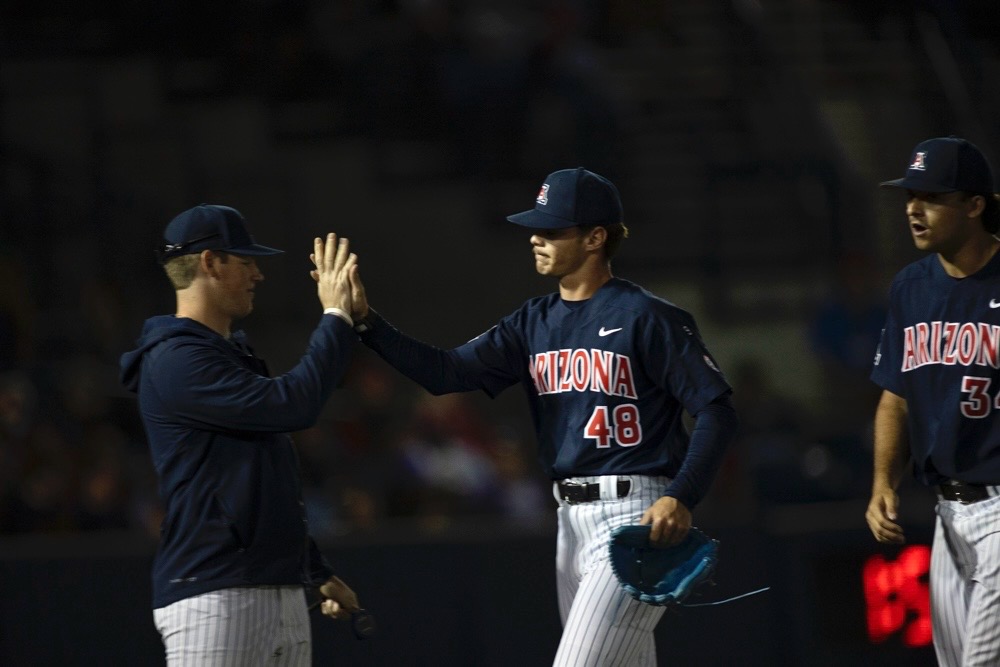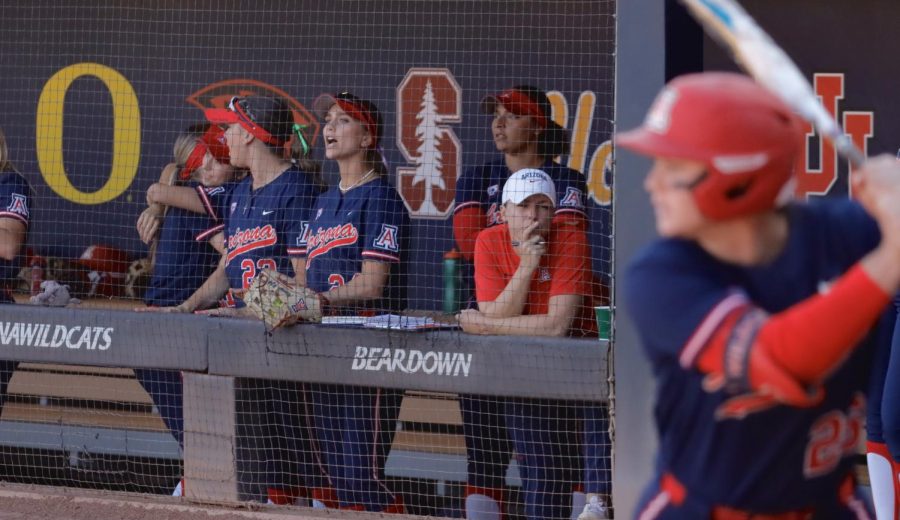Walking up to the plate with the bases loaded and two outs in the 11th inning against Mississippi State last season, Arizona catcher Cesar Salazar took a deep breath and swung his bat. Blacking out during the midst of the action, Salazar sprinted to first base with the voice of his first base coach yelling in his ear. Salazar soon blinked back into his senses and saw his teammates sprinting toward him as he just hit a walk-off single and punched their ticket to the 2016 College World Series.
“When I hit that ground ball and I saw it through, I completely blacked out,” Salazar said. “I just remember my coach from first base reminding me to touch the base and after I touched, I just remember seeing everybody running toward me. It was such an amazing feeling.”
Salazar has always hoped that he would one day be a part of something big like the College World Series, but to get to where he is now, Salazar had to go through many obstacles.
Growing up in Hermosillo, Mexico, Salazar never thought about coming to the United States to play baseball until he was about 15 years old. When Salazar was 14 years old, he was playing against older players pushing him to work harder and mature early as a player.
Many of his friends and teammates began signing with professional baseball teams at the age of 14, but his father knew it wouldn’t be beneficial for him.
“He knew my education was going to be messed up and I wasn’t going to study high school,” Salazar said. “He knew it was going to hurt me.”
Salazar’s father started talking to him about the option of going to the U.S., but Salazar was unsure as he was only 14 and didn’t want to leave home. Seeing many of his teammates and friends playing with professional teams, Salazar just wanted to play the game.

Luis Valenzuela, who ran a club team called the Nogales Roadrunners, went down to Mexico for a tournament and invited Salazar to play in the states knowing, saying it would open other opportunities. Salazar worked hard and played as a shortstop for the team alongside Valenzuela’s son, Luis III.
“I told him what I was trying to do,” Valenzuela said. “My goal was always to use baseball as a tool to get him a four-year degree.”
Coming from an educated and driven family, it was a priority for Salazar to get a better education, even if that meant him going to America.
“Valenzuela gave me the opportunity to play with him every weekend or every other week and go travel with him,” Salazar said. “That was the best thing that could’ve happened to me. He is the one that brought me to the U.S.”
Before making the transition and moving to America, Valenzuela sat down and talked to Salazar and his family about changing Salazar’s position from a shortstop to a catcher.
“Cesar was a very good shortstop, but he didn’t have the size of a shortstop for major league baseball,” Valenzuela said. “He had quick feet, was fast and had good hands with very quick release. So I told him, ‘In my opinion, if you really want to pursue reaching MLB, your best bet would be as a catcher.’”
Salazar was unsure of the position change as he played shortstop very well, but he soon realized the switch was going to be more beneficial for him in the future.
One of the first steps in coming to the U.S. was finding somewhere to live. Salazar went to a tournament with the Roadrunners in Fort Myers, Florida, where he met Vinnie Tarantola.
Salazar was one of the only kids on the team who could speak English as he told Tarantola how he hoped to, one day, come to the U.S. to play high school and college baseball.
“Vinnie called me and said him and his dad were willing to bring me to their house because his high school needed a catcher,” Salazar said. “My mom didn’t want that at first because I was this ‘baby’ and she didn’t want me to go, and my dad was a little hesitant because he didn’t know the family either.”
Salazar never looked at the cons of going to America and only considered the benefits and opportunities it would provide him. After talking with his parents and getting to know the Tarantola family, a decision was made.
“I made my first big decision on my own and told them [parents] that I wanted to do it because it was going to be the best opportunity I would get,” Salazar said. “It was the best decision of my life so far.”
Salazar moved to America and was welcomed into the Tarantolas’ home. Even though Salazar left Mexico, the tradition and his culture stayed alive.
“In Mexico, we are very into our culture,” Salazar said. “And it was nice because the Tarantola’s had the same culture as my home.”

Enrolled at Sahuaro High School, Salazar became a part of the baseball team under head coach Mark Chandler.
The Tarantolas took all the steps for Salazar to be eligible to play during high school, but the Arizona Interscholastic Association stated that Salazar was ineligible to play during his sophomore year.
“During my sophomore year, I wasn’t too mad because I just thought it was the rule, so I was just practicing and playing some JV games,” Salazar said. “But I played year-round summer and club ball during the same time, so I didn’t mind.”
Going into his junior year at Sahuaro, the AIA ruled that Salazar would be ineligible to play once again. This time, Salazar started to get frustrated but knew that his time would eventually come. Senior year approached and Salazar was able to play in the first 18 games before AIA ruled him as ineligible, forcing Chandler to pull him off the field.
“After the first two games, I just relaxed and told myself to play the game,” Salazar said. “By my senior year, I was already committed to the UA.”
Although high school baseball wasn’t the experience Salazar hoped for, Valenzuela made sure he was still practicing and developing as a player. Salazar played with his travel team ran by Valenzuela during the summer and was able to get in touch with UA coaches.
“Once he was contacted by different programs, including Arizona, that was when he relaxed and got excited,” Valenzuela said. “All the work he put toward his goal—he finally began to see the results.”
Salazar wasted no time making his mark on the UA baseball team under head coach Jay Johnson. Salazar pushed himself and was determined to reach his goals. Helping his team as a freshman get to the 2016 College World Series was one of the biggest moments of Salazar’s baseball career.
“It was the best experience of my life,” Salazar said. “I’ve never played in front of so many people in my life.”
Salazar has grown as a player thanks to his coaches at the UA; they have taught him and the team how to be winners and focus on the mental strength when being a baseball player. Salazar connected with his teammates at the UA quickly and adapted to college baseball fast due to his maturity level.
“Cesar is a great guy and a great teammate,” said UA pitcher and roommate Randy Labaut. “We both came on our official visit together, and right away we connected as friends. We both speak Spanish also, so there was an instant connection. Pitching with Cesar is great. He always keeps me on my toes, and that is always fun.”
Salazar is now in his sophomore year at the UA and is still determined to grow as a player and hopefully reach the College World Series once again. Salazar has the support from his parents, who come to home games, Valenzuela and the Tarantola family.
Salazar looks to never give up on baseball and plans on staying in the U.S. to, one day, be drafted into the MLB.
“I have never thought about not doing baseball,” Salazar said. “Baseball is going to be the thing that helps maintain me and my family. I don’t plan on having a backup plan. I just want to focus on baseball.”
Follow Syrena Tracy on Twitter









